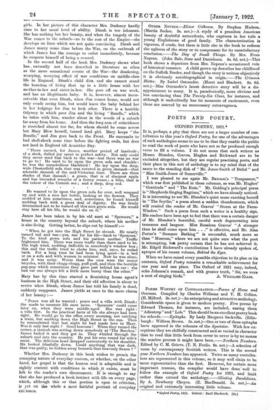POETS AND POETRY.
OXFORD POETRY, 1921.*
IT is, perhaps, a pity that there are not a larger number of con- tributors to this year's Oxford Poetry, for one of the advantages of such anthologies seems to me to be that they enable the public to read the work of poets who have not so far produced enough verse to fill a volume. I do not mean that such writers as Messrs. Blunden, Graves, Hughes and Rickward are to be excluded altogether, but they are regular practising poets, and their place in this sort of anthology is to my mind that of the sauce to the standing dish of " Mr. Jones-Smith of Baliol " and " Miss Smith-Jones of Somerville."
I was pleased to see again Mr. Bateson's " Trespassers," which was first published in these columns, as was Mr. Hughes' " Gratitude " and " The Ruin." Mr. Golding's principal poem is " Shepherds Singing Ragtime," which we have already noticed. It is interesting to see•Mr. Blunden's quiet muse exerting herself in " The Scythe," a poem about a sudden thunderstorm, which will remind the reader of Mr. Graves' " Storm at the Farm- Window." Such a poem from such a writer is a healthy sign. His readers have been apt to feel that there was a certain danger of Mr. Blunden's beautiful, careful work degenerating into tameness and languor. Miss Rosaleen Graves' " A stronger than he shall come upon him . . ." is effective, and Mr. Alan Porter's " Summer Bathing " is successful, much more so than " Museum," where we are not quite sure what the poet is attempting, but pretty certain that he has not achieved it. Mr. Edgell Rick-ward's contributions I have-already spoken of, apropos of his recent volume, Behind the Eyes.
When we have raised every possible objection to its plan or its contents, Oxford Poetry remains a remarkable achievement for one year and one place. The Oxford of 1921 may, indeed, echo Johnson's remark, and with greater truth, " Sir, we were










































 Previous page
Previous page